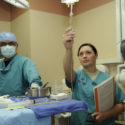The Democratic National Committee has already passed a resolution favoring the admission of Puerto Rico as the 51st state. The Republican Party Platform speaks out for statehood for Puerto Rico. And Hurricane Maria, while devastating to Puerto Rico and the Island’s people, has helped stateside politicians and voters alike understand that the residents of Puerto Rico are U.S. citizens.
But it can still seem as though Puerto Rico is not included in the national life. It is true that the territory is not included in the political life of the United States. And it is certainly likely that Puerto Rico will be more thoroughly included in the economic life of the nation after statehood. But Puerto Rico is already connected with the 50 states.
One example is the saline solution shortage that followed Hurricane Maria.
Baxter International is an important maker of saline solution for the entire United States. They have three plants in Puerto Rico, and 100 days after Hurricane Maria made landfall, electricity was still unstable at all of those plants. By November, the entire U.S. was facing a shortage of saline solution, which is needed for many patients. Saline solution is used in surgery, to clean wounds, to hydrate patients, and for many other purposes. A shortage of saline solution is a problem for nearly every medical facility.
The shortage has continued. The Food and Drug Administration has had to take some extraordinary measures to help U.S. hospitals cope with the shortage. For example, they’ve allowed some saline to be sold in the states even if the manufacturers aren’t FDA approved.
They’ve also asked for Baxter International’s plants to get priority on the list of electricity customers to get full power restored.
However, Baxter International is now back on the grid, but they’re still having to rely on back up generators to try to keep the electricity stable.
Manufacturing machinery can’t always handle “dirty” electricity — electricity that has a lot of fluctuations, as Puerto Rico’s electricity continues to have. Dirty electricity can cause industrial machinery to break or misbehave, an issue when the product must be sterile and accuracy measured, as saline solution packs must. Having the Baxter plants back on the grid is an important first step, but there are still issues to deal with.
The U.S. needs Puerto Rico.
The United States needed Puerto Rico for easy access to the Panama Canal while it was being built, for the Island’s strategic location in war time, and for military bases in the 20th century. But Puerto Rico continues to be important to the U.S. in ways most Americans don’t even realize. Saline solution is a good example, but there are other pharmaceutical products made largely in Puerto Rico, along with chemicals, electronics, mesh for repairing hernias, food, clothing, rum, and more.
The other side of the coin is the fact that Puerto Rico imports much of its goods from the states. While there were efforts to increase Puerto Rico’s locally made foods before Hurricane Maria, roughly 85% of all food consumed in Puerto Rico has been sent in from the U.S. mainland for many years. Puerto Rico is an important market for stateside companies.
Puerto Rico is strongly connected with the states, not least because of the 5 million plus people of Puerto Rican heritage now living in the states. These connections will increase after statehood, of course, but they are strong enough now that a failure to strengthen that connection will increase prosperity not only in Puerto Rico, but also in the United States as a whole.
There’s no going back. We must go forward. Join us in the fight for Puerto Rico statehood.








No responses yet